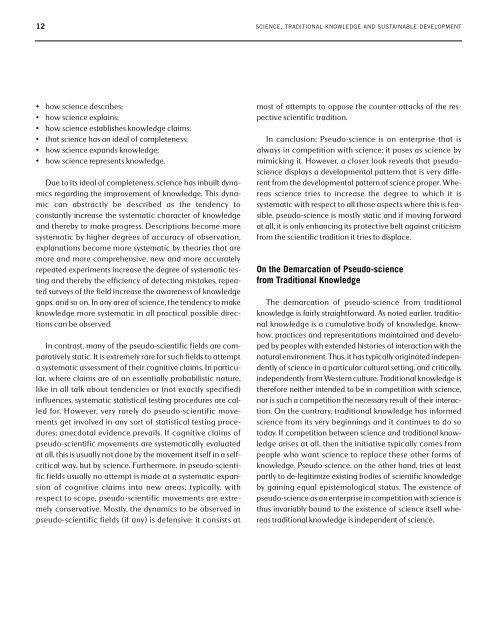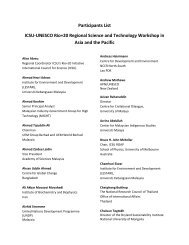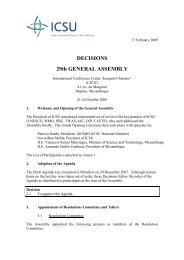Science, Traditional Knowledge and Sustainable Development
Science, Traditional Knowledge and Sustainable Development
Science, Traditional Knowledge and Sustainable Development
You also want an ePaper? Increase the reach of your titles
YUMPU automatically turns print PDFs into web optimized ePapers that Google loves.
12<br />
• how science describes;<br />
• how science explains;<br />
• how science establishes knowledge claims;<br />
• that science has an ideal of completeness;<br />
• how science exp<strong>and</strong>s knowledge;<br />
• how science represents knowledge.<br />
Due to its ideal of co m pl e te n es s, science has inbuilt dy n am<br />
i cs re g arding the improvement of knowledge. This dy n amic<br />
can abstra c tly be des c r i bed as the te n d e n cy to<br />
co n s tan tly incre ase the sys te m atic chara c ter of knowl e d g e<br />
<strong>and</strong> th e re by to make progress. Des c r i p tions be come more<br />
sys te m atic by higher degre es of accura cy of ob s e rvati o n ,<br />
e x pl an ations be come more sys te m atic by th e o r i es th at are<br />
m o re <strong>and</strong> more co m p re h e n s ive, new <strong>and</strong> more accurate l y<br />
re pe ated experiments incre ase the degree of sys te m atic testing<br />
<strong>and</strong> th e re by the effi c i e n cy of dete c ting mista kes, re pe ated<br />
surveys of the field incre ase the aware n ess of knowl e d g e<br />
g a p s, <strong>and</strong> so on. In any area of science, the te n d e n cy to make<br />
k n owledge more sys te m atic in all pra c ti cal po s s i ble dire ctions<br />
can be ob s e rved.<br />
In co n tras t, many of the pseudo-scienti fic fields are co mparatively<br />
static. It is extremely rare for such fields to atte m p t<br />
a sys te m atic as s essment of their cogn i tive claims. In par ti cul<br />
ar, wh e re claims are of an es s e n tially proba b i l i s tic nature ,<br />
l i ke in all talk abo ut te n d e n c i es or (not exa c tly spe c i fi e d )<br />
i n fl u e n ces, sys te m atic stati s ti cal tes ting proce dures are ca lled<br />
fo r. Howeve r, ve ry rarely do pseudo-scienti fic movements<br />
get invol ved in any sort of stati s ti cal tes ting procedures;<br />
an e cd o tal ev i d e n ce prevails. If cogn i tive claims of<br />
p s e u d o - s c i e n ti fic movements are sys te m ati cally eva l u ate d<br />
at all, this is usually not done by the movement itself in a selfc<br />
r i ti cal way, but by science. Fur th e r m o re, in pseudo-scientific<br />
fields usually no attempt is made at a sys te m atic expansion<br />
of cogn i tive claims into new are as; typ i ca l l y, with<br />
res pect to sco pe, pseudo-scienti fic movements are extremely<br />
co n s e rvative. Mo s tl y, the dy n am i cs to be ob s e rved in<br />
p s e u d o - s c i e n ti fic fields (if any) is defe n s ive: it consists at<br />
S C I E N C E, T R A D I T I O N A L K N O W L E D G E A N D S U S TA I N A B L E D E V E L O P M E N T<br />
most of attempts to oppose the co un te r - atta c ks of the respe<br />
c tive scienti fic tra d i ti o n .<br />
In co n c l usion: Ps e u d o - s c i e n ce is an enterprise th at is<br />
a l ways in co m pe ti tion with science; it po s es as science by<br />
mimicking it. Howeve r, a closer look reveals th at pseudos<br />
c i e n ce displ ays a deve l o p m e n tal pattern th at is ve ry different<br />
from the developmental pattern of science proper. Where<br />
as science tr i es to incre ase the degree to which it is<br />
systematic with respect to all those aspects where this is feasible,<br />
pseudo-science is mostly static <strong>and</strong> if moving forward<br />
at all, it is only enhancing its protective belt against criticism<br />
from the scientific tradition it tries to displace.<br />
On the Demarcation of Pseudo-science<br />
from <strong>Traditional</strong> <strong>Knowledge</strong><br />
The demarcation of pseudo-science from tra d i ti o n a l<br />
k n owledge is fairly strai g h tfo rward. As noted ear l i e r, tra d i ti onal<br />
knowledge is a cum u l ative body of knowledge, know -<br />
h ow, pra c ti ces <strong>and</strong> re p res e n tations mai n tained <strong>and</strong> deve l oped<br />
by pe o pl es with extended histo r i es of inte ra c tion with th e<br />
n atural env i ronment. Thus, it has typ i cally originated indepe nd<br />
e n tly of science in a par ti cu l ar cu l tural setti n g, <strong>and</strong> criti ca l l y,<br />
i n d e pe n d e n tly from Wes tern cu l ture. Tra d i tional knowledge is<br />
th e re fo re neither intended to be in co m pe ti tion with science ,<br />
nor is such a co m pe ti tion the neces s ary result of their inte ra ction.<br />
On the co n trary, tra d i tional knowledge has info r m e d<br />
s c i e n ce from its ve ry beginnings <strong>and</strong> it co n ti n u es to do so<br />
tod ay. If co m pe ti tion be tween science <strong>and</strong> tra d i tional knowledge<br />
ar i s es at all, then the initi ative typ i cally co m es fro m<br />
pe o ple who want science to re pl a ce th ese other forms of<br />
k n owledge. Ps e u d o - s c i e n ce, on the other han d, tr i es at leas t<br />
par tly to de-legiti m i ze existing bod i es of scienti fic knowl e d g e<br />
by gaining equal episte m ol og i cal status. The existe n ce of<br />
p s e u d o - s c i e n ce as an enterprise in co m pe ti tion with science is<br />
th us invar i a bly bo und to the existe n ce of science itself wh ere<br />
as tra d i tional knowledge is independent of science .




